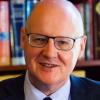As I read Nigel Biggar’s brief on “Order” a couple of areas are of interest and speak to me of the work that I have been doing over the last few years in collegiate education as Principal of Emmanuel College at the University of Queensland and Master of Queen’s College within the University of Melbourne.
Colleges in the Australian setting have often been seen as just a place to live rather than part of the education process. In Australia’s oldest universities, Sydney in 1850 and Melbourne in 1853 and Queensland sixty years later, the churches were excluded and theology explicitly banned from the curricula. The Church established colleges on the fringes of the universities that were initially theological with residential facilities. Eventually, in most cases, the residential subsumed the theological.
In such a setting how does the College with Christian roots engage with the ‘secular’ university and wider society? Nigel’s paper challenges me to think how I engage with my students, most of whom are not Christians, the academy and the wider community in which I find myself.
Centre for the Study of Science, Religion and Society #
During my time at Emmanuel College, University of Queensland, we founded a Centre for the Study of Science, Religion and Society, launched in 2012 by Professor Peter Harrison. It was started as part of the centenary celebrations of the College to give some substance to the mantra of our founding chairman, the Reverend Dr Ernest Northcroft Merrington, that a collegiate education was about an education for life not just for livelihood. For Merrington, education went beyond mere utilitarianism and meant dealing sometimes with dangerous ideas that we may not agree with and in his context as a Christian was ultimately tied up with what did a life committed to Jesus Christ look like. Nigel reinforces this view.
The Centre for the Study of Science, Religion and Society partnered with Christian academics at the university, particularly but not exclusively in law and science, in order to host events and to act as a bridge into the wider community through alumni and wider connections. Using the College as a base we were often able to deal with subjects that were anathema to many ‘mainstream’ academics. As Nigel notes: “This Christian vision of academic work as virtuous rational exchange is not universally shared by those who work in higher education”. Amongst our overseas speakers we were able to host, Brian Heap, Bob White, Alister McGrath, Terry Halliday, John Lennox, Robert Mann and Kevin Hart.
In a conference format we dealt with a number of important issues, bringing together academics and practitioners from the wider community. These included “Freedom of Faith” with the Attorney General of the day as the keynote speaker; the Future of the Media with a number of editors and journalists from national newspapers and television; and “Faith and Public Office” with a former state Governor and Chief of the Army, a Speaker of the state parliament and deputy Prime Minister.
The Centre became a safe place for conversations around tough questions regarding a Christian perspective within the academy, commerce and government. We also ran practical workshops to help young graduate and academics to think through their discipline from a Christian perspective and how to write and publish their ideas.
The Sugden Institute #
In the Melbourne context, at Queen’s College, University of Melbourne, we have established the Sugden Institute, named after the founding Master who was a Methodist minister, theologian, musician, scientist and literary critic. We have sought to engage again with the academy and the wider community through seminars and lectures on issues of contemporary interest from Indigenous affairs to climate change. We again have done this through partnerships with other institutes and Centres at the University, particularly AsiaLink, the India Institute and the Robert Menzies Institute. Bringing together academics and practitioners in international relations we have again sought to address and understand relations between states and the legal and moral underpinning of relationships.
Great Moral Issues and Prophetic Witness #
Nigel’s paper was an encouragement to me regarding the work of Christian colleges beyond our bed and breakfast operations as a bridge between the academy and the wider community to discuss big ideas of national and international importance. I am reminded of the importance of our place in the public square as we contribute to the national and international debate in what many see as a dangerous decade. In the medieval town, business, government, church and university faced each other across the town square conversing through their architecture but also holding each other accountable through public debate. I am again reminded by Nigel of this important privilege and responsibility that we have as Christian leaders within a collegiate community to humbly address the great moral issues of the day as prophetic witnesses.


